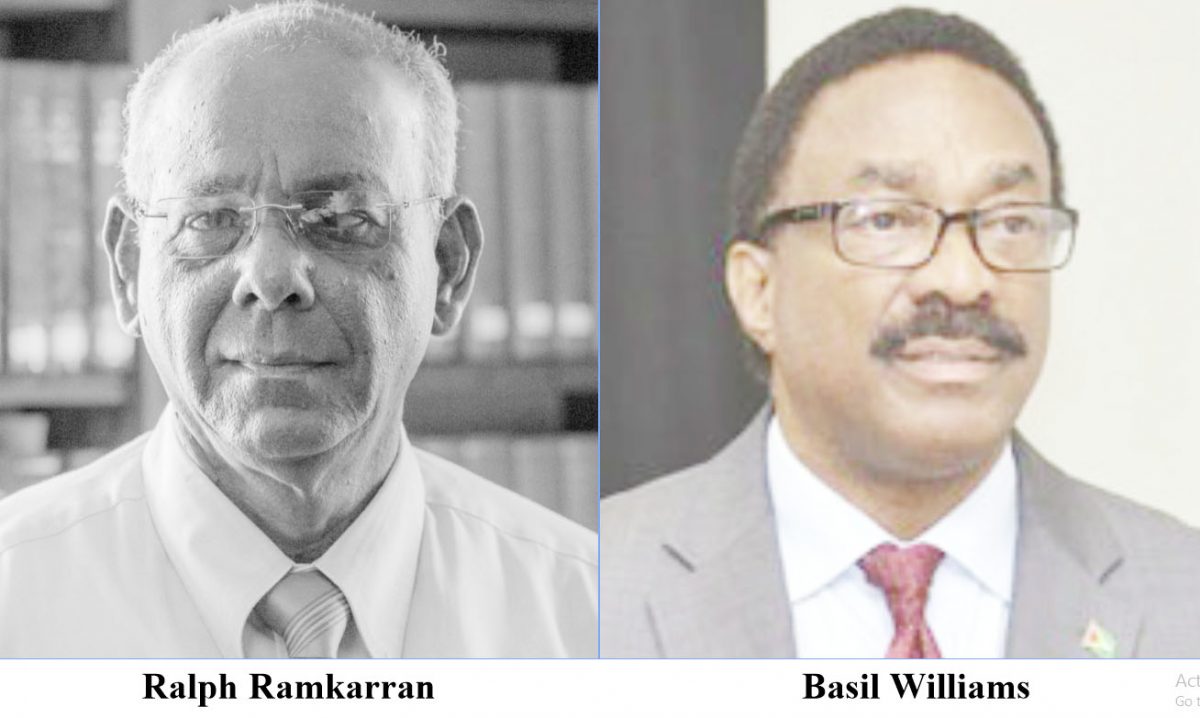The Guyana Court of Appeal will soon rule on the challenge mounted by the state which advances that Guyanese outside of Guyana, whether residing or otherwise, cannot vote unless they are resident in Guyana at the qualifying date of registration.
Following the conclusion of arguments yesterday afternoon, acting Chancellor Yonette Cummings-Edwards informed that notices will be sent “shortly” informing when the court will render its decision.
Among the issues raised during the presentation of arguments, and upon which the court is expected to rule, is whether it should decline jurisdiction to hear and determine the matter.
Senior Counsel Ralph Ramkarran who represents attorney Christopher Ram, one of the respondents in the case, has repeatedly argued that the appellate court ought to decline jurisdiction in the matter since the issues to be resolved touch and concern elections and can therefore only be determined by an elections petition.
The state’s challenge is birthed in the appeal to a ruling made last year by acting Chief Justice Roxane George-Wiltshire that existing registrants cannot be excised from a new voters’ list unless they are deceased or otherwise disqualified in accordance with the constitution.
The Attorney General’s contention on behalf of the state, however, is that the requirement of residency must be satisfied before Guyanese abroad can cast their ballot. Such persons he argues, must be resident in Guyana at the qualifying date of registration.
In his presentation to the court over the past few days, Ramkarran has argued that all matters connected to elections must, in accordance with the Validity of Elections Act, be determined via an elections petition.
Strongly opposing this position, however, Attorney General (AG) Basil Williams argues that the case presents issues of constitutional law and is therefore properly before the appellate court which ought to exercise its jurisdiction and adjudicate the matter.
According to the AG, since the matter commenced in the High Court long before the president issued the proclamation for elections to be held on March 2nd, it could not possibly fall within the ambit of being a matter which can only be determined after elections and by way of an elections petition.
Ramkarran, however, disagrees, advancing that while this is the case, the issues concern elections and further that the current challenge before the Court of Appeal is now being heard after the proclamation announcing the elections, has already been made.
Drawing a metaphorical analogy, Ramkarran said that “once the election train leaves the station, then every issue related thereto must be decided by way of an elections petition.”
With the commencement of the case predating the proclamation announcement, however, Chancellor Cummings-Edwards sought to enquire from counsel, “when does the train leave the station?”
In response he said, “for me, the train leaves the station when the proclamation date is announced.”
Against this background the senior counsel said that if the court were to go ahead and rule on the matter, it would be violating the Validity of Elections Act. In those circumstances he urged the appellate judges hearing the case to decline jurisdiction.
It was this point that the chancellor sought to enquire from counsel whether pausing or declining to hear the matter until after elections by an elections petition which would have to be done before the High Court—would not essentially be leading to a re-litigation of the matter before the court below which has already ruled.
Acknowledging that he had no law to support such a scenario, Ramkarran advanced what he described as an “innovative argument.”
He then suggested that the appellate court could put the matter down and postpone its ruling until after elections, then, treating it as an elections petition, thereafter give its decision.
He said he believed that such flexibility and possibilities exist in a legal way, in the rules of court to facilitate such a scenario as raised by the chancellor.
Both Ramkarran and attorney Anil Nandlall who also represents Ram, had asked the court on Monday to decline jurisdiction over the matter, urging that the chief justice’s ruling be made to stand.
They expressed fear that if the appellate court were to interfere with the ruling and decide otherwise, it could have grave consequences, given all the preparations which have already been made for elections which are now imminent.
Also presenting arguments yesterday was Senior Counsel Stanley Marcus who represents the Guyana Elections Commission (GECOM), another respondent in the matter.
He argued that since the issue of residency was not pleaded by Ram in his application on the House-to-House registration, from which the chief justice’s ruling on residency was made, this point ought not to have been dealt with or decided by her.
According to Marcus, an applicant’s pleadings must be clearly stated and outlined, while noting that the court will then have to rule on those stated issues. He said that the issue of residency was never pleaded or complained about by Ram.
Opposing Marcus’ arguments, however, was attorney Teni Housty who represents the Guyana Bar Association which appears amicus in the proceedings.
Citing case law, he argued that the chief justice did not fall into error by ruling on “residency” as Marcus sought to contend.
He said that as a matter of fact, there are cases where, though an issue may not have been specifically pleaded by an applicant, it arises on the affidavit and a court may then adjudicate on it.
Moreover, he said that there are instances where a court may even invite the parties to reexamine and modify their grounds/pleadings.
Against this background counsel emphasized that the chief justice committed no error in ruling on the issue in question.-
The case is being heard by Chancellor Cummings-Edwards and Justices of Appeal Dawn Gregory and Rishi Persaud.





